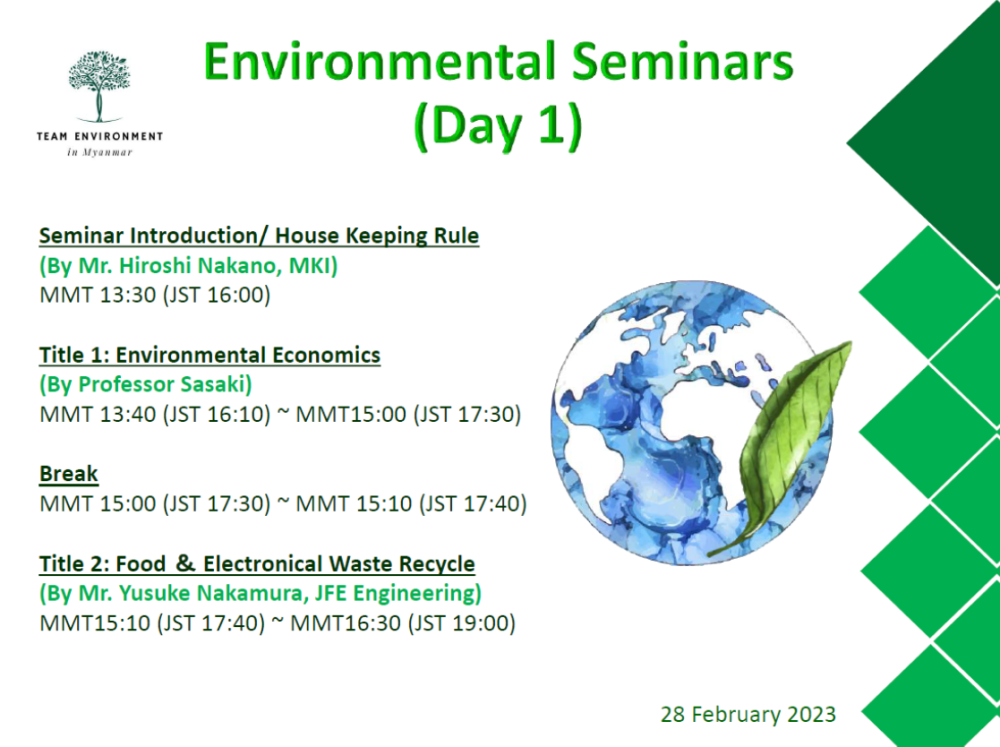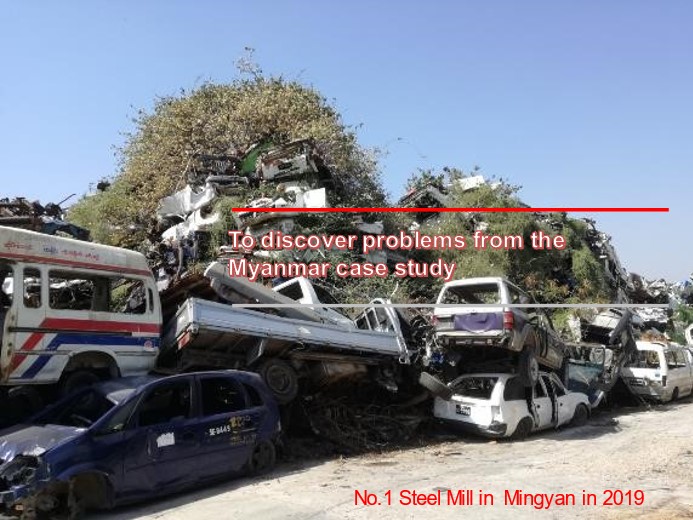2023.03.13
News
Faculty of Economics’ Professor So Sasaki gives lectures for young talents in Myanmar on environmental economies issues
On February 28th, 2023, Professor So Sasaki, Faculty of Economics, gave an online lecture to young talents in Myanmar regarding environmental economics.
The lecture was held by “TEAM Environment in Myanmar.” This voluntary team mainly consists of Japanese companies that involve the environment sector in their business lineup, and Japanese companies eager to develop business in the environment sector. They exchange opinions on common issues or long-term outlook regarding how to cope with the environmental area, or how to deal with a new decarbonized market.
In a discussion, participants agreed that it is vital to foster the human talent specializing in the environmental sector in Myanmar. Since the military takeover occurred in Myanmar in February 2021, educational institutions such as universities are still closed, and considerable impacts linger as of March 2023, disturbing and creating a blank period to build a structure for fostering human talents.
Considering such context in this country, the Team Environment in Myanmar is holding the “Team Environment Education Seminar” intended for environmentally sensitive companies, Japanese companies’ personnel in charge of strategy planning of environment/ SDGs/ Carbon Neutral, or those who are in charge of putting into practice, International bodies such as the UN, or university students. They believe that fostering potential environmental human talents through this seminar will contribute to environmental friendliness in Myanmar.
Our Professor So Sasaki took the rostrum on the very first day of the seminar, with the theme of “Environmental Economics and Waste Management.” There were 68 audience members from Myanmar’s private companies and university students.
In the seminar, the actual practices in Japan were shared in order to convince that legal restraints are essential for the environmental business market to function properly, and confirmed how designing policies and business models in an economic analysis ways are material when considering environmental issues economically. Then, discovered problems from actual cases of ELVs(End of Life Vehicles)in Myanmar※1 and discussed about the necessary measures and international cooperation that needs to be taken. As for the conclusion, it was specified that, looking into aimed circular economy from the perspective of economics, an economic model of decreasing resource consumption along with adding value is required.
After the lecture, there was time for Q&A, where an active discussion took place. Below is one of the questions asked,
Q: “What are the problems and potentials for Myanmar when building a circular economy?”
A: “The biggest problem is the fact that Myanmar has no detailed regulations of the Environmental Law System yet. However, the country has the potential to leapfrog when regulations are enacted and administered. Concretely speaking, by employing IT techniques and tracking information, you can ensure the traceability of the “from waste to recycling material” process, and we are implementing experimental works to constitute the basis of the circular economy.”※2
Teacher’s Mumbling
It was when I was went to Myanmar in 2001, as part of the International Exchange Program organized by the Cabinet Office※3, that I decided to be “a professional of international cooperation in the environmental area”. It took a while for me to show my gratitude to Myanmar, and it was not until I got a chance to support the enactment of the Waste Management Law in the country as an expert on the Ministry of the Environment’s project, “Research and Countermeasures for Improving Ability of Waste Management in Myanmar”. Unfortunately, though, just before giving the final presentation, the project was forced to halt due to the political change that occurred in February 2021. When I was at a loss about what to do, I received an email from one of the central governmental officers who didn’t attend the Civil Disobedience Movement, saying, “even if the government has changed, we cannot stop processing waste every day”. The note made me realize that I am yet to be a professional and decided to cooperate within the scope of my abilities. So when I heard about the project of this seminar from a member of “TEAM Environment in Myanmar”, I needed no second bidding. Considering the situation Myanmar is facing now, it is not easy to say to people to “be in hope,” but it will be really great if only a little of my message is sent to those who should lead Myanmar in the future, “please don’t stay away from learning”.
※1Learn more from Hokkai-Gakuen Organization of Knowledge Ubiquitous through Gaining Archives
※2 Learn more about “Construction of a smart resource recycling system”;
https://plus-c.chuo-u.ac.jp/researcher/so-sasaki/
※3 Cabinet Office Homepage


